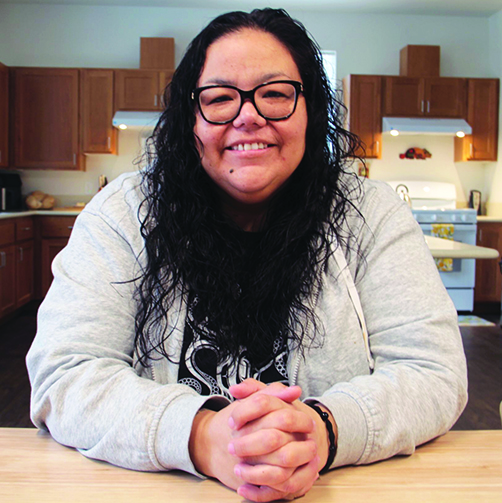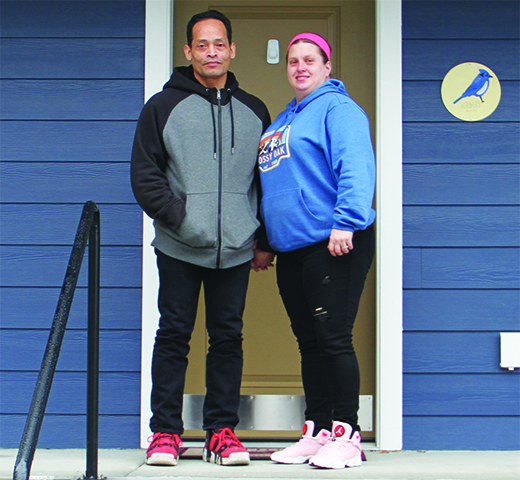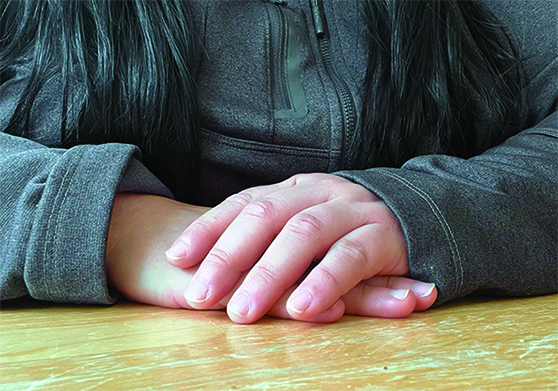
By Shaelyn Smead, Tulalip News
Before Christmas, tenants began moving into 17 one- and two-bedroom tiny homes for unhoused Tribal members at the Village of Hope. As some of these tenants once struggled to find warmth, safety, and stability, the Village became their saving grace. And though they come from different walks of life, they all have a community and place to feel welcome.
Heather Gobin:

What is your backstory, and how did you come to Village of Hope?
Most people who know me wouldn’t guess this is my reality. I come from a good family and am usually the responsible older sibling. I became a stay-at-home mom, raising two kids who graduated from college. I was raised a believer in Jesus, but more often than not, I was self-righteous. I didn’t understand anything about the drug life and lacked sympathy for my ex when he struggled with addiction. Somewhere along the way, I forgot he was my best friend, and eventually, he passed. I never thought anything like that would happen to me. The streets quickly humbled me. I never recovered from my traumas, and losing my kids’ dad hurt me. I lost everything: my mind and house and began using. Being homeless, I gained perspective in a way I would’ve never had before. I used to look down on homeless people and eventually became one. It could happen to any of us. It changed my heart. I thank God for our Tribe for building a place like this.
What were the first few moments like when you moved in?
It was a very emotional day. I was extremely thankful and humbled. I felt like I was experiencing the grace of God through my Tribe, and I felt like I could finally breathe and relax. It wasn’t a feeling I had felt for a long time. I just sat there in tears, thanking God that I finally had a roof over my head and a place that was mine. I felt safe and like I was no longer a burden to anyone.
How has having housing made a difference in your life?
I feel like it’s opening doors for me to help others. Now that I am at a more stable point with this housing, I can begin to share my story with other people and help them the way He has helped me.
What are some of the resources the Village provides or has connected you with, that have been helpful?
Of course, staying clean with the treatment center here at the Tribe. When I first arrived, I looked around and recognized everyone. I knew their parents or grandparents, and we’re all in this together. That moved me in a big way. When I first moved into the Village, I thought it was only a six-month program, but hearing that it is a permanent assistant living grant, I was elated. And I just thought, all right, I can do this, I am ready. Then they asked me what I wanted to accomplish, like getting a GED, learning how to cook, getting a job, money management, credit building, etc. I have always struggled with money, so when I was offered a job working within the building and saw that I could take these classes, I was excited. I am also a traditional weaver of 26 years, so as a part of the cultural classes, I will also help teach the other tenants how to weave.
What are some of the goals or dreams of the future since moving into the village?
I want to start with small goals and learn to care for myself. Eventually, I would love to start a nonprofit named after my ex. I want to replicate a place like this, buy a piece of land, and put tiny homes on it. And I want to reach out to people in recovery because something like this [Village of Hope] could turn someone’s life around. It could determine the future of their kids and grandkids. Many parents are battling addiction or are just checked out, and grandparents are left raising their kids. I don’t want kids to live through this life without their parents. I hope that places like this will continue to uplift people and parents to become better. I would also love to build an art studio for recovering addicts to showcase their artwork.
Alex and Jennifer Hatch:

What is your backstory, and how did you come to Village of Hope?
Jennifer: We have struggled with addiction since we first met. And even more, after my mom passed. We bought a travel trailer, but finding a place with good hookups, water, or power was hard. It was awful, run by a slumlord, and the site would flood with water up to our shins. That’s what we lived in. When you’re in that type of place and living with addiction, it is impossible to get sober or even want to try; it almost ended us.
Alex: Eventually, we got clean, and I started looking for assistance from the Tribe. It happened to be right around when they were finishing these houses, so I got a job, and everything evolved from there.
What were the first few moments like when you moved in?
Jennifer: Like we were on Extreme Home Makeover. It was fully furnished, with extra household items like bedding, pots and pans, food, toilet paper, etc. It was like we won the lottery. We were full of emotions, and we were so thankful for it. Sometimes it’s still hard to believe we are here and have this opportunity.
Alex: We are amazed by how many people want to help. There was no judgment, but we never felt worthy of receiving help before and thought we had to do it alone. But the Village was here with their arms wide open, willing to help us stay on our path to redemption.
How has having housing made a difference in your life?
Jennifer: We have a new perspective on life. There are so many possibilities, and we finally feel we can breathe.
Alex: It makes me proud to be Tulalip. This is a great example of what Tulalip is doing to help its people. It’s not just an idea; it was put into motion and is directly helping people. We have a strong community within the Village and from the staff supporting us. We come from a hard place, but the people here understand that. We wake up daily and see one big family, and we’re grateful to be here. This has become the foundation for our new life and sobriety.
What are some of the resources the Village provides or has connected you with that have been helpful?
Alex: The UAs [urinary analysis] help keep us accountable and clean. From what we’ve heard and discussed, we look forward to the many classes they will provide. We want to learn more life skills like money management and credit counseling to build our future. They also are helping and supporting us to find jobs.
What are some of the goals or dreams of the future since moving into the village?
Jennifer: We are trying to save money and build stability. We would love to fix our credit, pay off some of our debt, and eventually take out a small loan to build a home on our property.
Alex: It is so fulfilling to start dreaming of the future again. We have so many ideas for the property, and now we have the potential to get started on them. I wouldn’t be able to do it anywhere else. We’re committed to making things better for our life, and this has been the best stepping stone for that.
Anonymous:

What is your backstory, and how did you come to Village of Hope?
It was an emergency. I was in a domestic violence (DV) relationship and found myself in a situation where my kids and I were out of a home. I suffered verbal and physical abuse for some time but was in denial. I was living in another state at the time when things got worse. I had family members looking out for me and connected me with people in the Tribe who handled these situations and encouraged me to take my kids and leave. Within a few months, I had a protection order and went from staying on a family member’s couch to moving into the Village of Hope.
What were the first few moments like when you moved in?
It was overwhelming but such a happy day. We were so grateful to be welcomed, but even the small things made a difference. We had the bare essentials but left so much behind when we moved out quickly. The blankets, pillows, a bunk bed, it all meant so much. I even appreciated that they had taken the time to make the bed. Seeing a made bed meant for us was such a difference after everything we had gone through. I remember feeling cozy the first night there, like a real home.
How has having housing made a difference in your life?
It has made all the difference. Running from a DV situation was so scary. But having my kids and the uncertainty of where we will go or what we will do next is terrifying. As a parent, you have the instinct to provide for your kids. I had to stay strong for them, but I didn’t have the answers. Our family and Tulalip community now surround my kids, and they love hanging in the communal building and being around everyone. I am so grateful for our Tribe and how they cared for my family and me.
What are some of the resources the Village provides or has connected you with that have been helpful?
The Tribe and Legacy of Healing (LOH) has been extremely helpful. When we returned, they helped provide car seats, winter clothes, and many other things. We’ll be in the middle of divorce filings for a while, and the Tribe has offered a great attorney to help me through it. But it’s been hard, and I am so used to being the oldest in my family and looking after everyone else. It was so foreign to me to accept help like this, and I had family and people working in the Tribe and LOH to remind me that it was okay, that I wasn’t in this alone.
What are some of the goals or dreams of the future since moving into the village?
I want to get back on my feet. Now that I don’t have to worry about saving up or looking for somewhere to live and that financial burden is gone, I can put my time and energy toward my next steps. I am now back in school, getting a job within the Tribe, and taking control of my life for my kids. Being away from the reservation for so long, I am excited to get my kids and me back into the community, involved in events, and connected to our culture. Being here is so healing.
The Tribe and Village of Hope have supported and impacted the lives of these tenants. With a fresh start, these tribal members can believe in themselves again and have better hopes for the future. For more information about the Village of Hope, contact Deloris Parks at dparks@tulaliptribes-nsn.gov